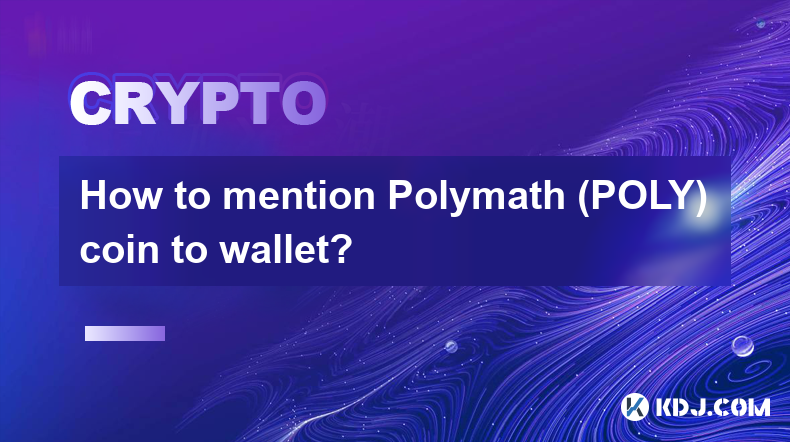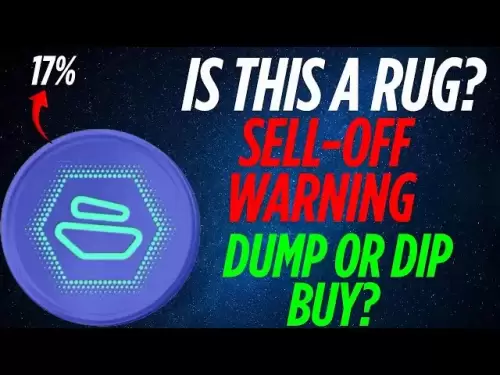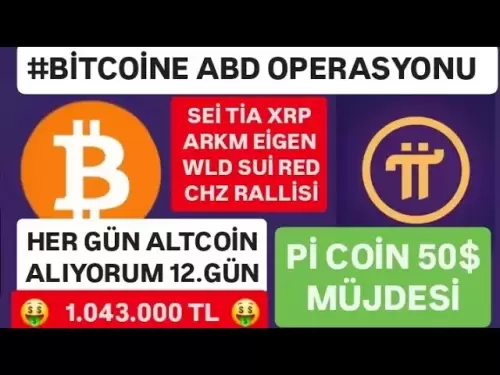-
 Bitcoin
Bitcoin $108,708.8110
0.60% -
 Ethereum
Ethereum $2,561.6057
1.91% -
 Tether USDt
Tether USDt $1.0001
-0.03% -
 XRP
XRP $2.2795
0.57% -
 BNB
BNB $662.2393
1.00% -
 Solana
Solana $153.1346
3.74% -
 USDC
USDC $1.0000
0.00% -
 TRON
TRON $0.2877
0.97% -
 Dogecoin
Dogecoin $0.1710
3.93% -
 Cardano
Cardano $0.5871
1.61% -
 Hyperliquid
Hyperliquid $39.6663
1.68% -
 Sui
Sui $2.9032
0.79% -
 Bitcoin Cash
Bitcoin Cash $496.1879
1.71% -
 Chainlink
Chainlink $13.5807
3.01% -
 UNUS SED LEO
UNUS SED LEO $9.0777
0.61% -
 Stellar
Stellar $0.2514
4.51% -
 Avalanche
Avalanche $18.1761
1.86% -
 Shiba Inu
Shiba Inu $0.0...01173
1.72% -
 Toncoin
Toncoin $2.8010
-4.23% -
 Hedera
Hedera $0.1594
3.21% -
 Litecoin
Litecoin $87.0257
-0.53% -
 Monero
Monero $319.1217
1.79% -
 Polkadot
Polkadot $3.3853
0.68% -
 Dai
Dai $0.9999
-0.01% -
 Ethena USDe
Ethena USDe $1.0003
0.02% -
 Bitget Token
Bitget Token $4.3420
-0.97% -
 Uniswap
Uniswap $7.3772
1.39% -
 Aave
Aave $286.6277
5.61% -
 Pepe
Pepe $0.0...09994
2.33% -
 Pi
Pi $0.4589
1.76%
How to mention Polymath (POLY) coin to wallet?
To add POLY coins to your wallet, create a compatible Ethereum wallet, fund it with ETH, add the POLY token address, and transfer tokens to the associated address, confirming the transaction and verifying your balance.
Dec 27, 2024 at 05:08 pm

Key Points:
- Polymath is an Ethereum-based platform for issuing and trading security tokens.
- POLY is the native utility token of the Polymath platform.
- To mention POLY coins to your wallet, you need to use a compatible wallet such as MetaMask, Trust Wallet, or Ledger Nano X.
How to Mention Polymath (POLY) Coin to Wallet:
Step 1: Create a Wallet
Create a cryptocurrency wallet that supports Ethereum and ERC-20 tokens. Popular options include MetaMask, Trust Wallet, and Ledger Nano X.
Step 2: Fund Your Wallet
Purchase Ethereum (ETH) and transfer it to your newly created wallet. ETH is the base currency used to pay transaction fees on the Ethereum network.
Step 3: Add POLY Token to Wallet
Add the POLY token contract address (0x9992ec3cf6a55b00978cdd286b222845b6d524d6) to your wallet. This will allow you to receive and manage POLY tokens.
Step 4: Buy or Receive POLY Tokens
Purchase POLY tokens on a cryptocurrency exchange or receive them from another user. Transfer the tokens to the address associated with your wallet.
Step 5: Confirm Transaction
Once you have initiated the transfer, confirm the transaction in your wallet. The transaction may take a few minutes to complete.
Step 6: Verify Balance
After the transaction is confirmed, check your wallet balance to ensure that the POLY tokens have been successfully deposited.
FAQs:
Q: What is a security token?
A: A security token represents ownership in an asset or a set of assets. Unlike traditional security offerings, security tokens are issued and traded on a blockchain, providing increased transparency, liquidity, and accessibility.
Q: What is Polymath used for?
A: Polymath is a platform for issuing and managing security tokens on the Ethereum blockchain. It provides a framework for creating compliant and regulated security tokens, facilitating efficient issuance, transferability, and trading.
Q: What is the purpose of POLY?
A: POLY is the utility token of the Polymath platform. It is used to pay transaction fees, participate in governance, and incentivize contributions to the Polymath ecosystem.
Q: What are the benefits of using a hardware wallet?
A: Hardware wallets like Ledger Nano X provide enhanced security for your crypto assets. They store your private keys offline, reducing the risk of unauthorized access and theft.
Q: Is Polymath regulated?
A: Polymath is working closely with regulators to ensure compliance with relevant laws and regulations. The platform incorporates security features such as KYC/AML procedures to prevent illegal activities.
Disclaimer:info@kdj.com
The information provided is not trading advice. kdj.com does not assume any responsibility for any investments made based on the information provided in this article. Cryptocurrencies are highly volatile and it is highly recommended that you invest with caution after thorough research!
If you believe that the content used on this website infringes your copyright, please contact us immediately (info@kdj.com) and we will delete it promptly.
- Bitcoin, Investment, Safe Buy: Navigating the Crypto Landscape in 2025
- 2025-07-08 06:30:12
- DegeCoin, Solana, and Meme Tokens: Riding the Wave or a Wipeout?
- 2025-07-08 07:10:12
- Brett Price, Arctic Pablo, and Meme Coins: What's the Hype?
- 2025-07-08 06:50:12
- Cryptos, Potential Gains, Early Investment: Spotting the Next Big Thing
- 2025-07-08 06:30:12
- Solana ETF Speculation Heats Up: SEC Deadlines and SOL Price Swings
- 2025-07-08 07:10:12
- PUMP Token, Solana Adoption, and Token Sales: What's the Buzz?
- 2025-07-08 07:15:12
Related knowledge

How to customize USDT TRC20 mining fees? Flexible adjustment tutorial
Jun 13,2025 at 01:42am
Understanding USDT TRC20 Mining FeesMining fees on the TRON (TRC20) network are essential for processing transactions. Unlike Bitcoin or Ethereum, where miners directly validate transactions, TRON uses a delegated proof-of-stake (DPoS) mechanism. However, users still need to pay bandwidth and energy fees, which are collectively referred to as 'mining fe...

USDT TRC20 transaction is stuck? Solution summary
Jun 14,2025 at 11:15pm
Understanding USDT TRC20 TransactionsWhen users mention that a USDT TRC20 transaction is stuck, they typically refer to a situation where the transfer of Tether (USDT) on the TRON blockchain has not been confirmed for an extended period. This issue may arise due to various reasons such as network congestion, insufficient transaction fees, or wallet-rela...

How to cancel USDT TRC20 unconfirmed transactions? Operation guide
Jun 13,2025 at 11:01pm
Understanding USDT TRC20 Unconfirmed TransactionsWhen dealing with USDT TRC20 transactions, it’s crucial to understand what an unconfirmed transaction means. An unconfirmed transaction is one that has been broadcasted to the blockchain network but hasn’t yet been included in a block. This typically occurs due to low transaction fees or network congestio...

How to check USDT TRC20 balance? Introduction to multiple query methods
Jun 21,2025 at 02:42am
Understanding USDT TRC20 and Its ImportanceUSDT (Tether) is one of the most widely used stablecoins in the cryptocurrency market. It exists on multiple blockchain networks, including TRC20, which operates on the Tron (TRX) network. Checking your USDT TRC20 balance accurately is crucial for users who hold or transact with this asset. Whether you're sendi...

What to do if USDT TRC20 transfers are congested? Speed up trading skills
Jun 13,2025 at 09:56am
Understanding USDT TRC20 Transfer CongestionWhen transferring USDT TRC20, users may occasionally experience delays or congestion. This typically occurs due to network overload on the TRON blockchain, which hosts the TRC20 version of Tether. Unlike the ERC20 variant (which runs on Ethereum), TRC20 transactions are generally faster and cheaper, but during...

The relationship between USDT TRC20 and TRON chain: technical background analysis
Jun 12,2025 at 01:28pm
What is USDT TRC20?USDT TRC20 refers to the Tether (USDT) token issued on the TRON blockchain using the TRC-20 standard. Unlike the more commonly known ERC-20 version of USDT (which runs on Ethereum), the TRC-20 variant leverages the TRON network's infrastructure for faster and cheaper transactions. The emergence of this version came as part of Tether’s...

How to customize USDT TRC20 mining fees? Flexible adjustment tutorial
Jun 13,2025 at 01:42am
Understanding USDT TRC20 Mining FeesMining fees on the TRON (TRC20) network are essential for processing transactions. Unlike Bitcoin or Ethereum, where miners directly validate transactions, TRON uses a delegated proof-of-stake (DPoS) mechanism. However, users still need to pay bandwidth and energy fees, which are collectively referred to as 'mining fe...

USDT TRC20 transaction is stuck? Solution summary
Jun 14,2025 at 11:15pm
Understanding USDT TRC20 TransactionsWhen users mention that a USDT TRC20 transaction is stuck, they typically refer to a situation where the transfer of Tether (USDT) on the TRON blockchain has not been confirmed for an extended period. This issue may arise due to various reasons such as network congestion, insufficient transaction fees, or wallet-rela...

How to cancel USDT TRC20 unconfirmed transactions? Operation guide
Jun 13,2025 at 11:01pm
Understanding USDT TRC20 Unconfirmed TransactionsWhen dealing with USDT TRC20 transactions, it’s crucial to understand what an unconfirmed transaction means. An unconfirmed transaction is one that has been broadcasted to the blockchain network but hasn’t yet been included in a block. This typically occurs due to low transaction fees or network congestio...

How to check USDT TRC20 balance? Introduction to multiple query methods
Jun 21,2025 at 02:42am
Understanding USDT TRC20 and Its ImportanceUSDT (Tether) is one of the most widely used stablecoins in the cryptocurrency market. It exists on multiple blockchain networks, including TRC20, which operates on the Tron (TRX) network. Checking your USDT TRC20 balance accurately is crucial for users who hold or transact with this asset. Whether you're sendi...

What to do if USDT TRC20 transfers are congested? Speed up trading skills
Jun 13,2025 at 09:56am
Understanding USDT TRC20 Transfer CongestionWhen transferring USDT TRC20, users may occasionally experience delays or congestion. This typically occurs due to network overload on the TRON blockchain, which hosts the TRC20 version of Tether. Unlike the ERC20 variant (which runs on Ethereum), TRC20 transactions are generally faster and cheaper, but during...

The relationship between USDT TRC20 and TRON chain: technical background analysis
Jun 12,2025 at 01:28pm
What is USDT TRC20?USDT TRC20 refers to the Tether (USDT) token issued on the TRON blockchain using the TRC-20 standard. Unlike the more commonly known ERC-20 version of USDT (which runs on Ethereum), the TRC-20 variant leverages the TRON network's infrastructure for faster and cheaper transactions. The emergence of this version came as part of Tether’s...
See all articles

























































































